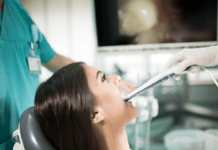We’ve all heard it before when questioning a patient about their medical history, “There is no change.” Patients are so quick to tell us no change or that nothing pertains to their teeth in regards to their medical history. Little do these patients know their medical history is a big key to unlocking their dental health care assessment and needs.
I work in both private practice, and I teach dental hygiene in clinical and classroom settings. I hear patients in both settings fail to disclose pertinent information to clinicians because they feel it doesn’t relate to their dental appointment. At the college, our clinical students spend upwards of 30 minutes interviewing their patients in regards to their medical history. We have them document medications, dosage, usage, and dental implications; they also record vitals, such as; blood pressure, pulse rate, and respiration. We have them meticulously review conditions, diseases, and allergies. This information is often noted in several places. This is not all for nothing though. Following the medical history interview, our students must have this information reviewed by a licensed dentist before they can proceed with treatment in the clinic. We’ve had to turn patients away for increased blood pressure and diabetic-related conditions. Patients often do not understand that their overall health is in direct relation to their oral health.
The same is a concern in private practice. Most offices update health histories electronically, and often it is done in the front reception area. Tablets are great tools for updating information through direct links into the software. The information gets placed directly into a patient’s chart and updates the clinical team of any new medications or conditions before the patient is brought to the operatory. One downfall I have found is patients are less likely to update correctly, and more likely to quickly say, “No change.”
There is still a need for face to face interview when it comes to medical history update. As a clinician, I try to take the time to interview each patient that is in my chair. I often recite what patients have listed in their medical history back to them, and make corrections to what they have listed themselves. Medications are often guessed on when a patient is filling in the questionnaire.; some patients do not know names of medications, dosages, what the medications are for, etc. It is alarming how many people are taking anti-hypertensive medications yet have no clue what their medication is called, or what it’s treating. I have asked patients if they are on a beta-blocker, calcium channel blocker, or a diuretic in multiple instances because it can make a difference in how we treat a patient.
For example, we are taught in multiple of our dental hygiene courses xerostomia can be a side effect of many medications. Xerostomia can lead to tissue irritations, burning tongue, and a highly increased risk for caries. Beta-blockers are a warning we need to use a cardiac dosage of epinephrine-containing anesthetic. Blood thinners, including aspirin, may increase gingival bleeding. Some anti-seizure medications can increase gingival over-growth. Most of these we know as clinicians, but our patient’s do not realize the direct relationship. There is an increase in patients taking these type of medications, especially with our increase of the baby boomers becoming the geriatric population.
Another concern is offices who offer nitrous oxide, may run into over-sedation risks. Patients are not always forthcoming with what they are taking to decrease the anxiety of a dental appointment. Some patients have access to anti-anxiety medications and may pre-medicate themselves prior to a dental appointment. They will then take any, and all anxiety-decreasing protocols offices provide, such as nitrous oxide. This puts a patient into conscious sedation, which is not allowed in most general dental offices. The patient may be completely innocent of this fact, or they may have complete knowledge of their actions and not forthcoming with their medications.
Regardless of whether a patient is negligent or innocent in withholding medical history information, if they do hold back, it’s not under our control. However, it is our job as clinicians to be highly thorough when it comes to a patient’s health conditions and medications. It may take more time out of our routine prophylaxis appointment to obtain further information, but we are also educators by trade, and it is important that we also educate our patients, so they are more knowledgeable about their health conditions in direct relation to their dental conditions. Most patients are very receptive to this information once a clinician takes the time to explain how their medications or conditions can relate to their dental care and overall dental health.
SEE ALSO: Getting Patients to Understand the Importance of Medical History
DON’T MISS: The Safest Appointment Begins with an Updated Medical History












